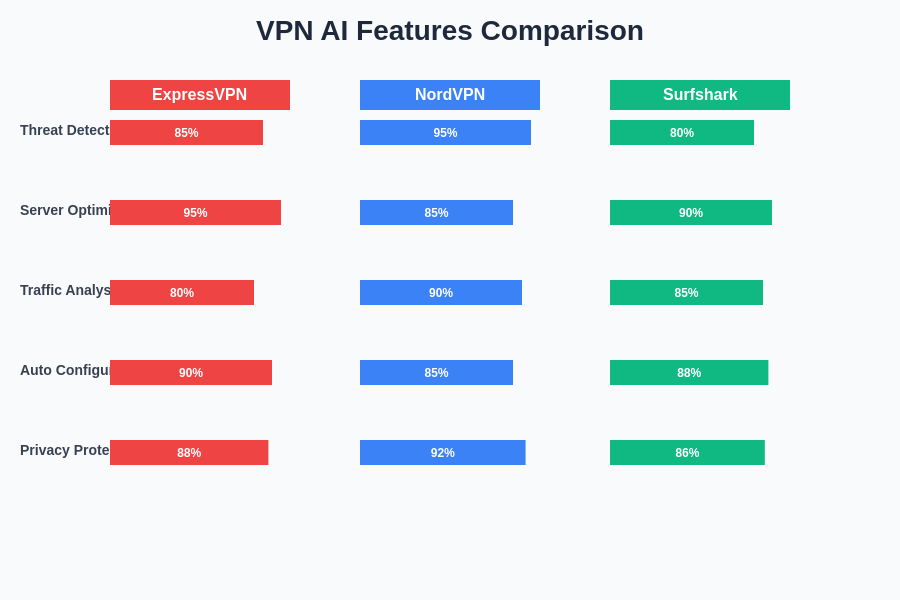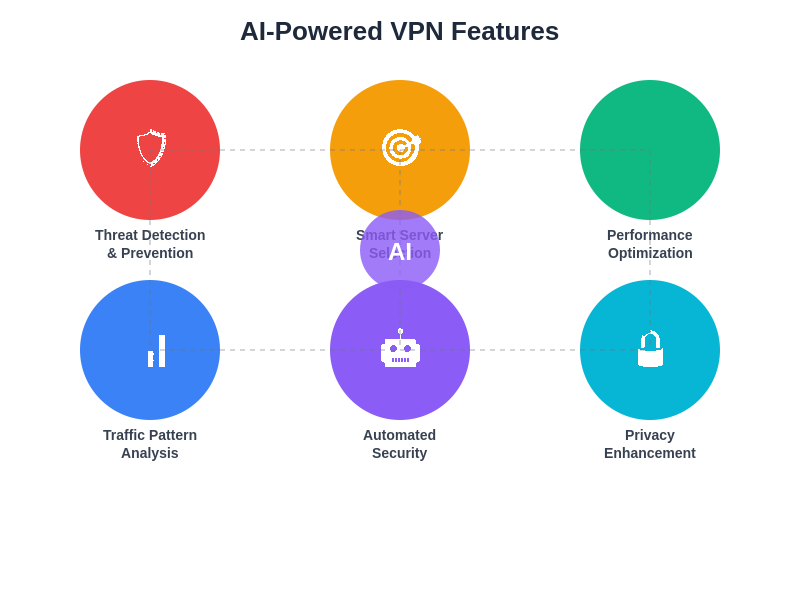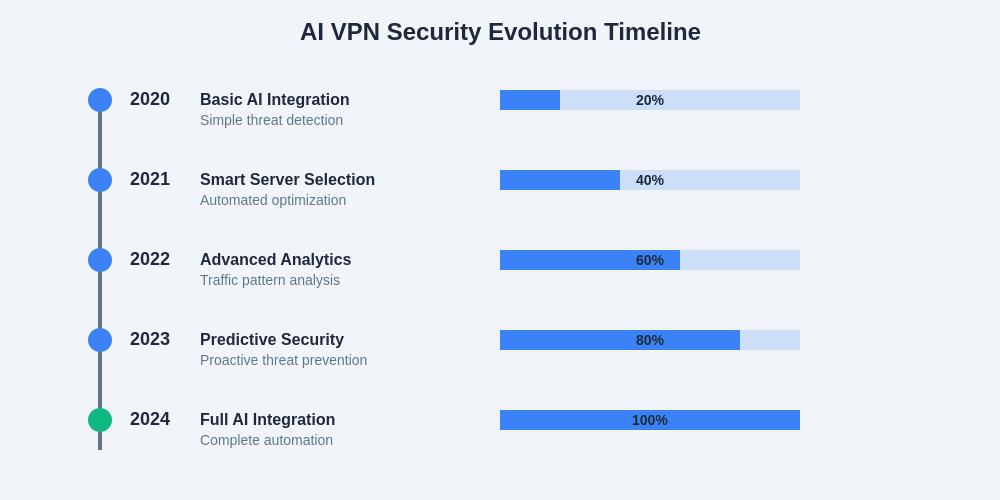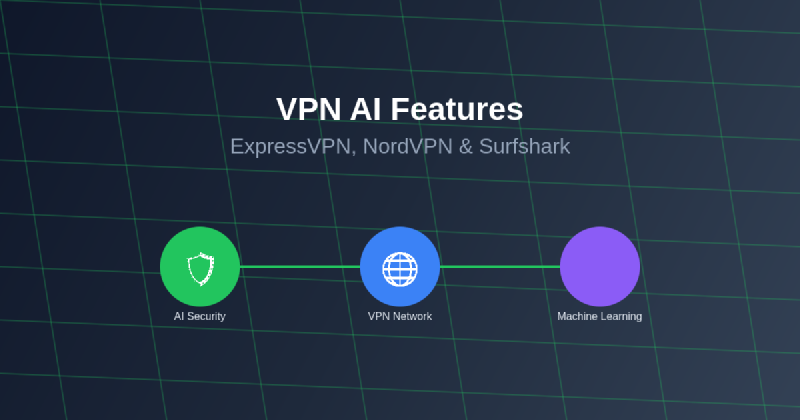The virtual private network industry has undergone a remarkable transformation with the integration of artificial intelligence technologies, fundamentally changing how users experience online privacy and security. Leading VPN providers ExpressVPN, NordVPN, and Surfshark have embraced AI-driven innovations to deliver unprecedented levels of protection, performance optimization, and user experience enhancement. This technological evolution represents a significant leap forward from traditional VPN services, introducing intelligent automation, predictive security measures, and adaptive network management that respond dynamically to changing online threats and user requirements.
Stay updated with the latest AI and cybersecurity trends to understand how artificial intelligence is reshaping digital security landscapes across various industries. The convergence of AI and VPN technology has created sophisticated security ecosystems that not only protect user data but also anticipate and prevent potential threats before they materialize, marking a new era in proactive cybersecurity defense.
The Evolution of AI-Powered VPN Technology
The integration of artificial intelligence into VPN infrastructure has fundamentally transformed how these services operate, moving beyond simple encrypted tunneling to sophisticated, intelligent security platforms. Modern AI-powered VPNs utilize machine learning algorithms to analyze network traffic patterns, identify potential security threats, and optimize connection performance in real-time. This evolution has enabled VPN providers to offer more than just basic privacy protection, incorporating predictive analytics, automated threat detection, and intelligent routing algorithms that adapt to user behavior and network conditions.
The shift toward AI-enhanced VPN services reflects the growing complexity of cybersecurity threats and the need for more sophisticated defense mechanisms. Traditional VPNs relied primarily on static encryption protocols and predetermined server locations, but AI-powered systems can dynamically adjust security parameters, select optimal server routes, and implement proactive threat mitigation strategies based on continuous analysis of global network conditions and emerging security patterns.
ExpressVPN’s AI-Enhanced Security Framework
ExpressVPN has positioned itself as a pioneer in AI-driven VPN technology, implementing sophisticated machine learning algorithms that continuously analyze network traffic to detect and prevent potential security breaches. The service’s AI-powered threat detection system operates in real-time, monitoring data flows for suspicious patterns that might indicate malware, phishing attempts, or other malicious activities. This proactive approach to security represents a significant advancement over traditional reactive security measures, enabling the system to identify and neutralize threats before they can compromise user data or privacy.
The company’s AI infrastructure extends beyond basic threat detection to encompass intelligent server selection algorithms that automatically choose the optimal connection points based on factors such as current server load, geographic proximity, connection speed potential, and security threat levels in different regions. This automated optimization ensures that users consistently receive the fastest and most secure connections available without requiring manual server selection or technical expertise.
ExpressVPN’s machine learning systems also analyze user behavior patterns to provide personalized security recommendations and automatically adjust protection levels based on the risk profile of different online activities. The AI algorithms can distinguish between routine browsing, sensitive financial transactions, and high-risk activities, implementing appropriate security measures for each scenario while maintaining optimal performance and user experience.
Enhance your digital security with advanced AI tools like Claude for comprehensive cybersecurity analysis and threat assessment capabilities. The integration of multiple AI platforms creates a robust security ecosystem that addresses various aspects of digital protection from different technological perspectives.
NordVPN’s Machine Learning Threat Intelligence
NordVPN has developed one of the most comprehensive AI-driven threat intelligence systems in the VPN industry, leveraging advanced machine learning algorithms to create a global security network that shares threat information across millions of users worldwide. The service’s AI platform continuously collects and analyzes security data from its extensive server network, creating detailed threat maps that identify emerging security risks, malicious IP addresses, and suspicious network activities in real-time.
The company’s AI-powered CyberSec feature represents a significant advancement in automated threat protection, utilizing machine learning algorithms to maintain dynamic blacklists of malicious domains, phishing sites, and malware distribution networks. This system operates at the DNS level, intercepting and blocking dangerous requests before they can reach user devices, providing an additional layer of protection that complements traditional antivirus and security software.
NordVPN’s artificial intelligence systems also power advanced network optimization features that automatically select the fastest available servers based on real-time performance metrics, user location data, and current network congestion levels. The AI algorithms continuously monitor server performance across the global network, predicting optimal routing paths and preemptively redirecting traffic to maintain consistent connection speeds and reliability even during peak usage periods or network disruptions.
The service’s machine learning capabilities extend to user experience personalization, analyzing individual usage patterns to provide customized server recommendations, security settings, and feature configurations that align with specific user needs and preferences. This intelligent customization ensures that each user receives optimal performance and security tailored to their unique online activities and risk profile.

The comparative analysis of AI implementations across major VPN providers reveals distinct strengths and approaches to artificial intelligence integration. Each service has developed specialized capabilities that address different aspects of the modern cybersecurity landscape, from automated threat detection to intelligent performance optimization.
Surfshark’s Intelligent Security Ecosystem
Surfshark has distinguished itself through the development of an intelligent security ecosystem that combines multiple AI-driven features to provide comprehensive online protection. The service’s CleanWeb technology utilizes advanced machine learning algorithms to identify and block advertisements, trackers, and malicious content in real-time, creating a cleaner and safer browsing experience while reducing bandwidth consumption and improving page loading speeds.
The company’s AI-powered MultiHop feature represents an innovative approach to connection security, using intelligent algorithms to automatically route user traffic through multiple server locations simultaneously. This multi-layered routing system makes it extremely difficult for potential attackers or surveillance systems to track user activities or identify connection origins, providing enhanced anonymity and security for users engaged in sensitive online activities.
Surfshark’s artificial intelligence systems also power sophisticated split tunneling capabilities that automatically categorize different types of internet traffic and route them through appropriate channels based on security requirements and performance considerations. The AI algorithms can distinguish between routine web browsing, streaming activities, file downloads, and sensitive transactions, applying optimal routing strategies for each category while maintaining seamless user experience across all online activities.
The service’s machine learning platform continuously analyzes global network conditions and security threats to provide real-time recommendations for optimal server selection, connection protocols, and security settings. This intelligent guidance system helps users make informed decisions about their VPN configuration while automatically implementing security best practices that align with current threat landscapes and individual usage patterns.
Advanced Threat Detection and Prevention
The integration of artificial intelligence into VPN technology has revolutionized threat detection and prevention capabilities, enabling these services to identify and neutralize security risks that would be impossible to detect using traditional methods. AI-powered threat detection systems analyze vast amounts of network data in real-time, identifying subtle patterns and anomalies that might indicate sophisticated cyber attacks, data breaches, or surveillance attempts.
Modern AI-driven VPN services utilize behavioral analysis algorithms that establish baseline patterns for normal network activity and immediately flag deviations that could indicate malicious behavior. These systems can detect advanced persistent threats, zero-day exploits, and sophisticated social engineering attacks that traditional security measures might miss, providing users with comprehensive protection against evolving cyber threats.
The predictive capabilities of AI-enhanced threat detection systems enable VPN providers to identify emerging security risks before they become widespread threats, allowing for proactive implementation of protective measures and security updates. This forward-looking approach to cybersecurity represents a fundamental shift from reactive security models to predictive threat prevention that stays ahead of malicious actors and emerging attack vectors.

The comprehensive ecosystem of AI-powered VPN features demonstrates how artificial intelligence technologies work together to create a sophisticated security platform. Each component contributes to overall protection while maintaining optimal performance and user experience through intelligent automation and adaptive learning.
Leverage advanced AI research capabilities with Perplexity to stay informed about the latest developments in cybersecurity and threat intelligence technologies. The combination of multiple AI platforms provides comprehensive coverage of emerging security trends and technological developments that shape the future of digital protection.
Intelligent Performance Optimization
Artificial intelligence has transformed VPN performance optimization from static configuration management to dynamic, real-time system adjustment that continuously adapts to changing network conditions and user requirements. AI-powered optimization algorithms analyze multiple performance variables simultaneously, including server load, network latency, bandwidth availability, and geographic routing efficiency, to ensure optimal connection performance under all circumstances.
Machine learning systems in modern VPNs continuously learn from user behavior patterns and network performance data to predict optimal configuration settings for different types of online activities. These intelligent systems can automatically adjust encryption levels, protocol selection, and routing paths based on the specific requirements of streaming, gaming, file downloading, or general web browsing, ensuring that users receive optimal performance for their intended activities without manual configuration adjustments.
The predictive capabilities of AI-driven performance optimization extend to proactive load balancing and traffic management, where algorithms anticipate network congestion and automatically redistribute user connections across available servers to maintain consistent performance levels. This intelligent traffic management prevents performance degradation during peak usage periods and ensures reliable service availability even under challenging network conditions.
AI-powered optimization systems also incorporate geographic and temporal analysis to predict optimal connection times and server selections based on global network patterns, local infrastructure conditions, and historical performance data. This comprehensive approach to performance optimization ensures that users consistently receive the fastest and most reliable VPN connections available regardless of their location or the time of day.
Privacy Protection Through Machine Learning
The application of machine learning to privacy protection represents one of the most significant advances in VPN technology, enabling services to provide sophisticated anonymization features that adapt to emerging surveillance techniques and privacy threats. AI-powered privacy systems continuously analyze global surveillance patterns, data collection practices, and privacy legislation changes to implement appropriate protective measures that align with evolving privacy requirements.
Modern AI-enhanced VPNs utilize advanced traffic obfuscation algorithms that make encrypted VPN traffic appear identical to regular internet traffic, preventing detection and blocking by sophisticated deep packet inspection systems. These machine learning algorithms continuously adapt obfuscation techniques based on analysis of detection methods used by various organizations and governments, ensuring consistent access to VPN services even in restrictive network environments.
The intelligent privacy protection capabilities of AI-powered VPNs extend to automatic detection and mitigation of various tracking techniques, including browser fingerprinting, behavioral tracking, and cross-device identification methods. Machine learning algorithms analyze user behavior patterns and implement appropriate countermeasures to prevent unauthorized data collection while maintaining optimal user experience and website functionality.
AI-driven privacy systems also provide intelligent recommendations for privacy settings and security configurations based on user location, local privacy laws, and individual risk profiles. These personalized privacy recommendations ensure that users receive appropriate protection levels for their specific circumstances while avoiding unnecessary restrictions that might impact usability or performance.
Automated Security Protocol Management
The complexity of modern encryption protocols and security standards has made manual configuration increasingly challenging for average users, leading to the development of AI-powered automated security protocol management systems. These intelligent systems continuously analyze current threat landscapes, encryption standards, and network conditions to automatically select and configure optimal security protocols for different situations and user requirements.
Machine learning algorithms in advanced VPN services analyze the effectiveness of different encryption methods against emerging threats and automatically update protocol selections to maintain maximum security protection. This automated approach ensures that users always benefit from the most current and effective security measures without requiring technical expertise or manual configuration updates.
AI-powered protocol management extends to intelligent switching between different security protocols based on network conditions, connection requirements, and detected threat levels. These systems can automatically escalate security measures when suspicious activities are detected or adjust protocol configurations to optimize performance for specific online activities while maintaining appropriate protection levels.
The predictive capabilities of AI-driven security management enable VPN services to anticipate future security requirements and proactively implement protective measures before new threats become widespread. This forward-looking approach to security protocol management ensures that users receive continuous protection against both current and emerging cybersecurity threats.
Real-Time Network Analytics and Insights
The integration of artificial intelligence into VPN infrastructure has enabled the development of sophisticated real-time network analytics platforms that provide unprecedented visibility into network performance, security threats, and user experience metrics. These AI-powered analytics systems continuously monitor global network conditions, identifying patterns and trends that inform strategic improvements to service quality and security effectiveness.
Advanced machine learning algorithms analyze vast amounts of network data to identify optimization opportunities, predict potential performance issues, and recommend infrastructure improvements that enhance overall service reliability and user satisfaction. This data-driven approach to network management enables VPN providers to make informed decisions about server deployment, capacity planning, and technology investments based on actual usage patterns and performance requirements.
The real-time analytics capabilities of AI-enhanced VPN services provide users with detailed insights into their connection performance, security status, and privacy protection levels. These intelligent reporting systems can identify potential issues, provide troubleshooting recommendations, and suggest configuration changes that improve individual user experience while maintaining optimal security and privacy protection.
AI-powered network analytics also enable predictive maintenance and proactive issue resolution, where machine learning algorithms identify potential network problems before they impact user experience. This predictive approach to network management ensures consistent service reliability and minimizes disruptions that might affect user productivity or security protection.
Future Developments in AI-Enhanced VPN Technology
The continued evolution of artificial intelligence technology promises to bring even more sophisticated capabilities to VPN services, with emerging technologies such as quantum-resistant encryption, advanced behavioral analysis, and predictive threat modeling expected to further enhance security and performance capabilities. These future developments will likely focus on creating more intelligent, adaptive, and user-centric VPN experiences that seamlessly integrate with evolving digital lifestyles and security requirements.
The integration of advanced AI technologies such as natural language processing and computer vision may enable VPN services to provide more intuitive user interfaces, automated security assessments, and intelligent recommendations that require minimal user interaction while delivering maximum protection and performance. These user experience enhancements will make advanced cybersecurity protection accessible to users with varying levels of technical expertise.
Future AI-enhanced VPN technologies may also incorporate advanced privacy-preserving machine learning techniques that enable service improvements while maintaining strict user privacy protection. These privacy-centric AI approaches will allow VPN providers to enhance their services based on aggregate usage patterns without compromising individual user anonymity or data protection.
The continued development of AI-powered cybersecurity technologies will likely result in VPN services that can predict and prevent sophisticated cyber attacks before they occur, providing proactive protection against emerging threats that traditional security measures cannot address. This evolution toward predictive cybersecurity represents the future of digital protection in an increasingly complex and interconnected digital world.

The evolution of AI-enhanced VPN technology demonstrates a clear progression from basic threat detection capabilities to sophisticated, fully integrated security ecosystems. This timeline illustrates how artificial intelligence has transformed from a supplementary feature to the core foundation of modern VPN security architecture.
Comparative Analysis of AI Implementation
When comparing the AI implementations across ExpressVPN, NordVPN, and Surfshark, each service demonstrates unique strengths and approaches to artificial intelligence integration. ExpressVPN focuses primarily on intelligent server selection and automated threat detection, providing users with seamless performance optimization and proactive security protection. The service’s AI algorithms excel at predicting optimal connection routes and automatically adjusting security parameters based on detected threat levels and network conditions.
NordVPN’s AI implementation emphasizes comprehensive threat intelligence and global security analysis, leveraging machine learning algorithms to create detailed threat maps and maintain dynamic blacklists of malicious entities. The service’s CyberSec feature represents one of the most advanced AI-powered threat blocking systems available, providing users with automatic protection against a wide range of online threats without requiring manual configuration or ongoing maintenance.
Surfshark’s approach to AI integration focuses on creating an intelligent security ecosystem that combines multiple AI-driven features to provide comprehensive online protection. The service’s CleanWeb technology and MultiHop routing capabilities demonstrate sophisticated applications of machine learning algorithms that enhance both security and user experience through intelligent automation and optimization.
The effectiveness of each provider’s AI implementation depends largely on individual user requirements, technical preferences, and specific security needs. Users seeking advanced threat intelligence and comprehensive global security coverage may prefer NordVPN’s machine learning approach, while those prioritizing performance optimization and seamless user experience might favor ExpressVPN’s intelligent routing algorithms. Surfshark’s integrated ecosystem approach appeals to users who want comprehensive AI-powered protection across multiple security domains.
Disclaimer
This article is for informational purposes only and does not constitute professional cybersecurity or technical advice. The views expressed are based on current understanding of VPN technologies and their AI implementations as of the publication date. Readers should conduct their own research and consider their specific security requirements when selecting VPN services. The effectiveness and features of AI-powered VPN technologies may vary depending on individual usage patterns, network conditions, and service provider implementations. Users should verify current service capabilities and pricing directly with providers before making purchasing decisions.
